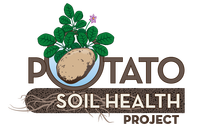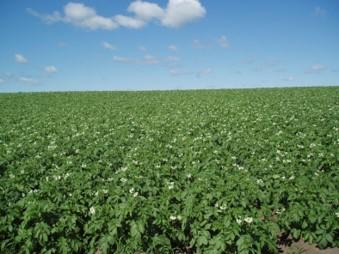
About
The Potato Soil Health Project was established to identify reliable indicators of soil health and effective methods for increasing soil health in potato cropping systems, to learn what determines whether growers adopt good soil health management practices, and, ultimately, to improve soil health in potato cropping systems across the United States. The four objectives of the project support these goals:
-
Optimize soil microbiomes and physiochemical characteristics to enhance potato health, productivity, and quality through soil management practices. In this component of the study, we use field experiments to determine how different soil management practices (e.g., use of fumigants, organic amendments, cover crops, and crop rotation) influence soil microbial composition and physical and chemical characteristics. In turn, we test for relationships between these soil characteristics and potato crop health, yield, and quality, in order to identify the mechanisms linking management practices to crop performance.
-
Identify on-farm indicators of soil health associated with potato crop health, productivity, and quality. This component of the study applies an observational approach to the links between management, soil health, and crop performance that dovetails with the experimental approach used in the first objective. As opposed to performing experiments and seeing what happens, we will be looking for the connections between the management approaches commercial growers are using in their own fields and the results those approaches produce in terms of soil health and crop performance.
-
Identify incentives and barriers to adopting practices that improve soil health in potato production. We will analyze alternative management practices identified in the first two objectives in terms of their cost effectiveness, rate of return, and economic risk to the grower, taking long-term effects such as pathogen buildup into account. In addition to economic incentives and impediments, we will investigate social and psychological factors that influence farmer decisions related to soil health and disease management.
-
Share our results with the potato industry to facilitate adoption of soil health best management practices. Putting the knowledge gained in the course of this project into the hands of growers is fundamental to its purpose. We will share our results not only through peer-reviewed journal articles, but also university extension publications, webinars, this website, our Twitter feed, and our Regional Soil Health Manuals. In addition, a national-scale outreach project is in its early planning stage.
